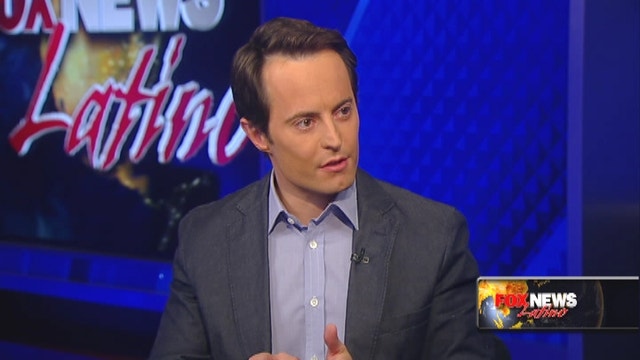Venezuela Opposition Leader’s Cousin Says He Will ‘Absolutely Not’ Be Allowed To Go Free
Bryan Llenas speaks to Leopoldo Lopez’s first cousin, Thor Halvorssen, the President of the Human Rights Foundation, about the protests, Lopez’s fate, and the future of the opposition movement.
For more than a month, Leopoldo Lopez, a leading voice of the opposition movement in Venezuela, has been sitting in a military prison facing charges of arson and conspiracy at the hands of President Nicolás Maduro’s socialist government.
Lopez, a politician and former presidential candidate, turned himself in in front of thousands of supporters Feb. 18th. He was initially charged with murder and terrorism for provoking violence during protests, and while those charges have since been dropped, if convicted, Lopez could face up to 10 years in prison. His hearing was held inside a parked bus.
Meanwhile, at least 30 people have been killed in clashes between protesters, security forces, and government supporters in the last five weeks. Tens of thousands of anti-government protesters, many university students, continue to march to the beat of complaints over high inflation, shortages of basic goods and ultra-violent crime. Maduro and his followers argue the opposition-led protests are an attempt at a coup.
“They (Venezuelan government) realize they are in a bit of pickle, because Leopoldo Lopez, in prison becomes a martyr for the opposition and Leopoldo Lopez outside of prison is the leader of the opposition, so it’s going to be interesting to see what happens,” Thor Halvorssen, president of the Human Rights Foundation, based in New York City, said to Fox News Latino. Halvorssen also happens to be Lopez’s first cousin.
When asked, if he thought the government would let Lopez out of jail anytime soon, Halvorssen, 38, bluntly said, “I don’t. No. Absolutely not. He has been the victim of prosecution for 10 years. They’ve tried everything...nothing sticks because it’s very difficult to create a case when there is so much scrutiny."
He continued: “His rights are being violated left, right and center ... I think its only a matter of time for the rest of the world to wake up and a very big way and what's going on in Leopoldo's case."
Lopez led demonstrations against President Hugo Chavez, including the 2002 ones that helped oust Chavez from power for two days before the Chavista government was restored. Lopez was barred from running in the November 2008 elections by Chavez over alleged corruption, though he and his supporters said it was because he had a legitimate chance to defeat Chavez.
But these protests are different, and more violent then ever. A National Guard soldier and a pregnant woman were killed Sunday, and with no end in sight, the death toll is being used as a political football by both sides in a blame game.
Government supporters, like American attorney and former Chavez Advisor, Eva Golinger, said the protests are made up of small concentrations of really less than a dozen people engaging in violence, throwing molotov cocktails and setting up barricades, with a specific goal of regime change.
“This is not a protest movement where people are trying to reclaim legitimate rights, they’re just trying to overthrow the government,” Golinger said in a Fox News Latino interview.
Halvorssen, and the opposition, contend the protests are being run by students and the violence is being incited by government authorities in an attempt to portray the anti-government protesters as violent.
“The state infiltrates the marches regularly and there's evidence of this and there's photographic and video evidence and they catch people who are throwing molotov cocktails...and in some cases they have their police identification on them,” Halvorseen said.
"Peaceful protest is a right, the deaths that have occurred in Venezuela should be the subject of a truth commission, Venezuela has had political deaths now for 12 years, and every time someone asks for a truth commission the state shuts it down."
Halvorssen, whose father was arrested and tortured by the Venezuelan government in 1993 and his mother was shot and wounded by members of the government in 2004, founded the Human Rights Foundation in 2005. Venezuela, before Chavismo, influenced him to push for human rights in the South American country.
“I looked into an abyss of a country with no rule of law, and I figured if this could happen to my father, it could happen to anybody else,” he explained, “one doesn’t choose what happens to members of one’s family, but you do have a choice in what you do in reaction to it."
The U.S. government has reacted to the Venezuelan protests with verbal condemnations and Halvorssen insisted the U.S. doesn’t need to get involved. But he called for the U.S. to clamp down on allowing members of Maduro’s socialist government keep billions in American banks.
As for the goal of these protests, “people want their rights and people want a better country, one that is not divided,” he said, noting that “49 percent of the people did not want (Maduro), yet he wants the 49 percent to be excluded and he should actually be governing for 100 percent of Venezuelans."






















